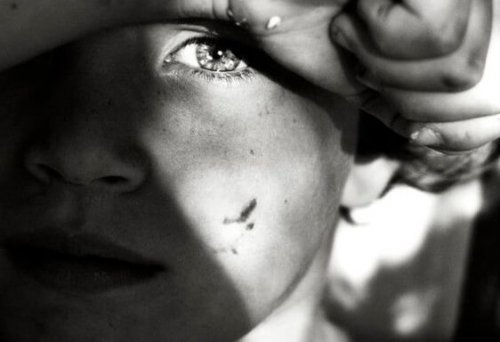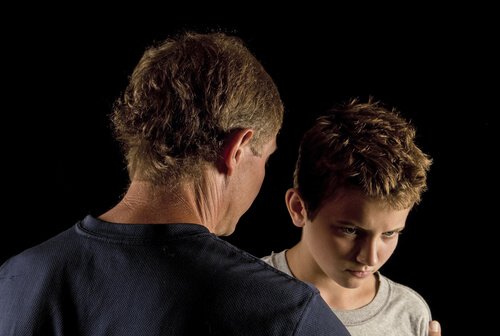Children with Emotionally Immature Parents


Written and verified by the psychologist Valeria Sabater
Children with emotionally immature parents suffer deep scars. Many children end up taking on adult responsibilities and they grow up too quickly. The combination of parental incompetence and negligence of that fragile bond blurs the lines between childhood and adulthood and destroys self-esteem.
We know that no one can choose their parents. As adults, we have the right to decide what kind of relationship we want to have with our parents, but a child can’t do that. Being born is like falling out of the sky. Some of us are caught by wonderful and competent parents that raise us in a safe, mature, and dignified way.
“There is no greater necessity in childhood than feeling the protection of parents”
On the other hand, some of us have bad luck and land in the arms of immature parents. They will determine the foundation of our personalities, whether we like it or not. Experts in children’s psychology and family dynamics know that two decisive and noteworthy things can happen in these cases.
Parents with clearly immature and incompetent personalities sometimes raise children who are equally immature or tyrannical. Another possibility is that their children take on the role of adult that the parents refuse to fulfill. That’s how some little ones end up taking care of their younger siblings, doing housework, or making decisions that don’t correspond to their age.
This last fact, as curious as it seems, will not make the child braver, more mature, or more responsible in a way that could be considered healthy. The end result is more children in the world who have lost their childhood. Let’s dig deeper into this subject…

Emotionally immature parents means a childhood cut short
Something we all agree on is that having children doesn’t make us parents. Healthy and meaningful fatherhood and motherhood are made by being present and cultivating a strong, enriching, and true affection. The child should be part of life, not a broken heart filled with fear, scarcity, and low self-esteem.
Aside from basic food and clothing, something that all children need is emotional accessibility. They need to feel connected to mature people in order to understand the world and understand themselves. If this fails, everything collapses. An emotionally immature parent fails to validate the feelings of his child. A mother who is only concerned with herself will neglect the emotional needs of her children.
On the other hand, it’s worth noting that these types of dynamics are more complex than they might seem at first. It is helpful to differentiate between the four types of emotionally immature mothers and fathers.

Parental Immaturity
The first type refers to mothers and fathers with erratic and varied behavior. They are emotionally unstable parents. They make promises that they don’t keep. They might be very present for their kids one day and make them seem like an irritation the next.
- Impulsive parents are those that act without thinking. They make plans without thinking of the consequences, they jump from one thoughtless mistake to another without weighing their actions.
- Passive parenthood is one of the clearest examples of immaturity. These parents don’t get involved, they are physically present but emotionally and mentally absent, and they adopt a “laissez-faire” style of child-rearing.
- Lastly, there are scornful parents, who make their children feel as if they are an irritation or that they are not wanted. They see child-rearing as over their heads and something they don’t want to be involved in.
These four types shape a childhood that is too short, wounded, and invalidated. Children who grow up in this context experience feelings of abandonment, loneliness, frustration, and anger.
Children playing adults: wounds that need healing
We mentioned at the beginning that a child who grows up playing the role of an adult does not always see herself as stronger, more mature, or happier. Giving an 8, 10, or even 15-year-old child the exclusive responsibility to take care of herself or a younger sibling, or to make decisions that her parents should be making leaves a scar and can potentially be the root of many problems.
“A rose gets its fragrance from the root, and man his virtue from his childhood”
The psychological consequences prevalent in these cases are as varied as they are complex. Emotional loneliness, inability to maintain stable relationships, feelings of guilt, emotional constraint, repression of anger, irrational thoughts, anxiety, and being overly self-demanding are all possible results.

Overcoming the wounds caused by a lost childhood and immature parents is not an easy task, nor is it impossible. Cognitive behavioral therapy is quite useful, as is accepting the wound caused by abandonment and neglect. Later comes the necessary reconciliation with ourselves. Here we allow ourselves to be angry and frustrated about our stolen childhood. Angry that we were forced to grow up too fast or that we were left alone too early.
We may have lost our childhood, but a beautiful and free life lies ahead of us. A life that will allow us what we always wanted and what we undoubtedly deserve. We will make sure that our parent’s immaturity doesn’t prevent us from having the happy present and future that we never got in the past.
Children with emotionally immature parents suffer deep scars. Many children end up taking on adult responsibilities and they grow up too quickly. The combination of parental incompetence and negligence of that fragile bond blurs the lines between childhood and adulthood and destroys self-esteem.
We know that no one can choose their parents. As adults, we have the right to decide what kind of relationship we want to have with our parents, but a child can’t do that. Being born is like falling out of the sky. Some of us are caught by wonderful and competent parents that raise us in a safe, mature, and dignified way.
“There is no greater necessity in childhood than feeling the protection of parents”
On the other hand, some of us have bad luck and land in the arms of immature parents. They will determine the foundation of our personalities, whether we like it or not. Experts in children’s psychology and family dynamics know that two decisive and noteworthy things can happen in these cases.
Parents with clearly immature and incompetent personalities sometimes raise children who are equally immature or tyrannical. Another possibility is that their children take on the role of adult that the parents refuse to fulfill. That’s how some little ones end up taking care of their younger siblings, doing housework, or making decisions that don’t correspond to their age.
This last fact, as curious as it seems, will not make the child braver, more mature, or more responsible in a way that could be considered healthy. The end result is more children in the world who have lost their childhood. Let’s dig deeper into this subject…

Emotionally immature parents means a childhood cut short
Something we all agree on is that having children doesn’t make us parents. Healthy and meaningful fatherhood and motherhood are made by being present and cultivating a strong, enriching, and true affection. The child should be part of life, not a broken heart filled with fear, scarcity, and low self-esteem.
Aside from basic food and clothing, something that all children need is emotional accessibility. They need to feel connected to mature people in order to understand the world and understand themselves. If this fails, everything collapses. An emotionally immature parent fails to validate the feelings of his child. A mother who is only concerned with herself will neglect the emotional needs of her children.
On the other hand, it’s worth noting that these types of dynamics are more complex than they might seem at first. It is helpful to differentiate between the four types of emotionally immature mothers and fathers.

Parental Immaturity
The first type refers to mothers and fathers with erratic and varied behavior. They are emotionally unstable parents. They make promises that they don’t keep. They might be very present for their kids one day and make them seem like an irritation the next.
- Impulsive parents are those that act without thinking. They make plans without thinking of the consequences, they jump from one thoughtless mistake to another without weighing their actions.
- Passive parenthood is one of the clearest examples of immaturity. These parents don’t get involved, they are physically present but emotionally and mentally absent, and they adopt a “laissez-faire” style of child-rearing.
- Lastly, there are scornful parents, who make their children feel as if they are an irritation or that they are not wanted. They see child-rearing as over their heads and something they don’t want to be involved in.
These four types shape a childhood that is too short, wounded, and invalidated. Children who grow up in this context experience feelings of abandonment, loneliness, frustration, and anger.
Children playing adults: wounds that need healing
We mentioned at the beginning that a child who grows up playing the role of an adult does not always see herself as stronger, more mature, or happier. Giving an 8, 10, or even 15-year-old child the exclusive responsibility to take care of herself or a younger sibling, or to make decisions that her parents should be making leaves a scar and can potentially be the root of many problems.
“A rose gets its fragrance from the root, and man his virtue from his childhood”
The psychological consequences prevalent in these cases are as varied as they are complex. Emotional loneliness, inability to maintain stable relationships, feelings of guilt, emotional constraint, repression of anger, irrational thoughts, anxiety, and being overly self-demanding are all possible results.

Overcoming the wounds caused by a lost childhood and immature parents is not an easy task, nor is it impossible. Cognitive behavioral therapy is quite useful, as is accepting the wound caused by abandonment and neglect. Later comes the necessary reconciliation with ourselves. Here we allow ourselves to be angry and frustrated about our stolen childhood. Angry that we were forced to grow up too fast or that we were left alone too early.
We may have lost our childhood, but a beautiful and free life lies ahead of us. A life that will allow us what we always wanted and what we undoubtedly deserve. We will make sure that our parent’s immaturity doesn’t prevent us from having the happy present and future that we never got in the past.
This text is provided for informational purposes only and does not replace consultation with a professional. If in doubt, consult your specialist.







